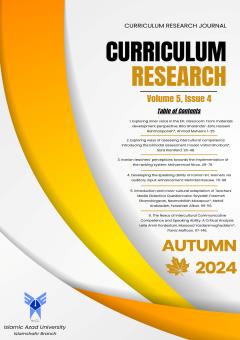Iranian teachers’ perceptions towards the implementation of the ranking system
Subject Areas : Curriculum Design and Development
1 - Department of Educational Sciences, Faculty of Islamic Education, Science and Research Branch, Islamic Azad University, Tehran, Iran.
Keywords: Educational Phenomenology, Professional Development, Ranking System,
Abstract :
The teacher ranking system in Iran is intended to enhance performance and motivation but encounters several challenges. This study aims to investigate Iranian teachers' experiences and perceptions of this ranking system using a qualitative, interpretative phenomenological approach. Data were gathered through semi-structured interviews with 15 teachers from various Iranian cities. Findings revealed that the ranking system impacted four main areas: psychological effects, professional development, transparency and fairness, and educational quality. It supports professional growth, transparency, and improved teaching methods, but can also cause stress, psychological pressure, and reduced focus on teaching, potentially lowering teaching quality. Strengths of the system include professional development, increased transparency, skill updates, and fostering healthy competition. Conversely, its weaknesses involve heightened stress, diminished teaching focus, and reduced quality. Recommendations for improvement include revising evaluation criteria, establishing supportive measures for teachers, involving them in the evaluation process, and increasing educational programs and workshops for professional development. These adjustments aim to mitigate the system's negative effects, boost teacher motivation and job satisfaction, and ultimately enhance the overall quality of education in schools.
Akbari, R., Khajani, A., Bozorgdari, L., & Mahmoudi Moghadam, S. (2022). Examining and analyzing job stress among teachers. In Proceedings of the Second National Conference on Applied Studies in Educational Processes (pp. xx-xx). Bandar Abbas. https://civilica.com/doc/1642692
Bagheri, B., Mehralizadeh, Y., Hosseinpour, M., & Bahmani, L. (2021). Developing a model for improving the quality of education based on social capital and internal efficiency. Educational Management Innovations, 17(1), 88-107.
Bandura, A. (1997). Self-efficacy: The exercise of control. New York: W.H. Freeman.
Brown, J., Smith, L., & Johnson, R. (2022). Transparency and fairness in teacher evaluation systems: A Canadian study. Journal of Educational Studies, 45(4), 321-335.
Bryk, A. S., & Schneider, B. (2002). Trust in schools: A core resource for improvement. Russell Sage Foundation.
Creemers, B., Kyriakides, L., & Antoniou, P. (2019). Teacher Professional Development for Improving Quality of Teaching. In Research on Teacher Training and Professional Development (pp. 3-11). Springer.
Danielson, C. (2007). Enhancing professional practice: A framework for teaching. ASCD.
Darling-Hammond, L. (2010). The flat world and education: How America's commitment to equity will determine our future. Teachers College Press.
Darling-Hammond, L. (2013). Getting teacher evaluation right: What really matters for effectiveness and improvement. Teachers College Press.
Deci, E. L., & Ryan, R. M. (1985). Intrinsic motivation and self-determination in human behavior. New York: Plenum.
Deci, E. L., & Ryan, R. M. (2000). The "What" and "Why" of goal pursuits: Human needs and the self-determination of behavior. Psychological Inquiry, 11(4), 227-268.
Dewey, J. (1916). Democracy and education. Macmillan.
Dewey, J. (1938). Experience and education. New York: Macmillan.
Ford, T. G., Urick, A., & Wilson, A. S. P. (2021). Exploring the effect of supportive teacher evaluation experiences on US teachers’ job satisfaction. Children and Youth Services Review, 131, 106297.
Green, A., Brown, J., & Ward, S. (2019). Teacher evaluation systems and their impact on motivation and performance. Journal of Educational Research, 112(2), 195-208.
Grissom, J. A., & Bartanen, B. (2019). Strategic retention: Principal effectiveness and teacher turnover in multiple-measure teacher evaluation systems. American Educational Research Journal, 56(2), 514-555.
Hattie, J., & Timperley, H. (2007). The power of feedback. Review of Educational Research, 77(1), 81-112.
Herzberg, F. (1966). Work and the nature of man. Cleveland: World Publishing Company.
Hoy, W. K., & Tarter, C. J. (2004). Organizational justice in schools: No justice without trust. International Journal of Educational Management, 18(4), 150-156. https://doi.org/10.1108/09513540410538831
Johnson, M. (2021). Teacher evaluation systems and their impact on teaching quality. International Journal of Education, 39(2), 180-195.
Kouseh, N. (2023). The importance and impact of professional development programs on teachers' performance and effectiveness. In Proceedings of the First International Conference on Law, Management, Educational Sciences, Psychology, and Educational Planning (Tehran). Retrieved from https://civilica.com/doc/2022989
Lee, S., Kim, J., & Choi, H. (2021). The impact of teacher ranking systems on teaching quality in South Korea. Asia-Pacific Science Education, 19(3), 155-170.
Maslach, C. (2021). Job burnout and occupational health psychology: The impact of teacher evaluation systems on stress. Psychology in the Schools, 58(4), 446-457.
Park, S., & Park, H. (2019). The role of administrative tasks in teacher stress and burnout. International Journal of Educational Research, 94, 48-57.
Rahimi, A. (2020). The impact of teacher ranking systems on professional development and motivation. Educational Management Journal, 10(1), 55-70.
Rawls, J. (1971). A theory of justice. Harvard University Press.
Ryan, R. M., & Deci, E. L. (2000). Self-Determination Theory and the Facilitation of Intrinsic Motivation, Social Development, and Well-Being. American Psychologist, 55(1), 68-78. https://doi.org/10.1037/0003-066X.55.1.68
Sen, A. (2009). The idea of justice. Harvard University Press.
Schmidt, K. (2014). Teacher evaluation: Theories and practice. Educational Assessment, Evaluation and Accountability, 26(1), 5-28. https://files.eric.ed.gov/fulltext/ED568337.pdf
Smith, J. A., Flowers, P., & Larkin, M. (2009). Interpretative phenomenological analysis: Theory, method and research. Sage Publications.
Smith, J., & Allen, R. (2019). Teacher workload and its effects on teaching practices. American Educational Research Journal, 56(4), 945-968.
Smith, J., & Jones, M. (2022). Teacher evaluation and mental health: A study in US schools. American Journal of Education, 30(2), 210-225.
Streubert, H. J., & Carpenter, D. R. (2006). Qualitative research in nursing: Advancing the humanistic imperative (4th ed.). Lippincott Williams & Wilkins.
Williams, T., & Clark, D. (2018). The relationship between teacher stress and teaching quality. Journal of Teacher Education, 69(3), 273-289.

